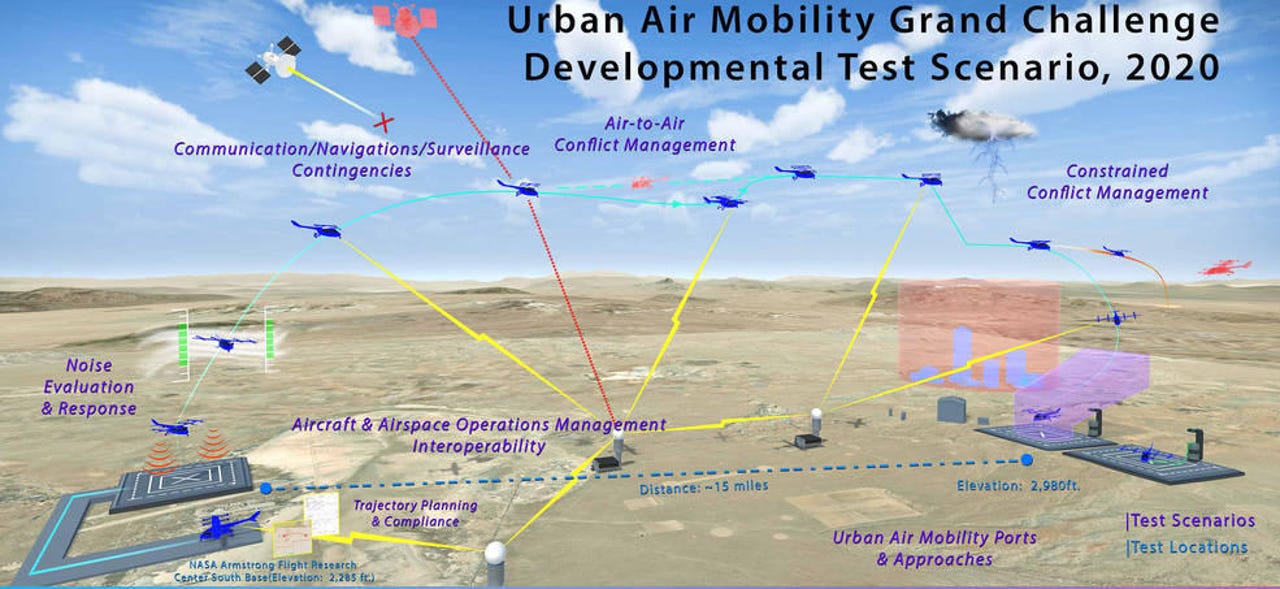NASA advances urban flying transport plans with 17 companies


The National Aeronautics and Space Administration (NASA) has now signed Space Act Agreements with 17 companies from the aviation industry, including Boeing, Uber, and AirMap, as part of its plans to bring air transport solutions and systems in and around densely populated metro areas through its urban air mobility (UAM) grand challenge.
According to the agency, if UAM is fully implemented it could enable the air transportation of things like small packages, taxi services, medical services, such as patient ambulance transportation, and cargo delivery to regional or rural communities.
"With this step, we're continuing to put the pieces together that we hope will soon make real the long-anticipated vision of smaller piloted and unpiloted vehicles providing a variety of services around cities and in rural areas," NASA associate administrator for aeronautics Robert Pearce said.
As part of the UAM grand challenge, NASA said it hopes to bring together different companies that intend to develop and operate air vehicles or support services to test the readiness of the capabilities, while also helping the Federal Aviation Administration formalise best practices and regulations.
"Our partnership with the FAA will be a key factor in the successful and safe outcomes for industry that we can expect from conducting these series of Grand Challenges during the coming years," Pearce said.
Read more: AI-powered autonomous drone could bring new capabilities to agriculture, logistics, more (TechRepublic)
Signing the five-year agreements has been the first step of the multi-stage challenge that would see the official competition take place in 2022, NASA said. Development technology testing is planned for this year to verify relevant flight testing scenarios, assist in data collection, and assess readiness.
Of the 17 companies that have signed up to participate, Joby Aviation will focus on providing a vehicle to fly as part of the challenge. Uber, AirMap, Airxos, Anra Technologies, Associates for International Research Inc, Avision, Ellie & Associates, GeoRq, Metron Aviation, OneSky Systems, and the University of North Texas will all focus on developing an airspace simulation. Boeing, Bell Trexton, NFT Inc, Prodentity, and Zeva, meanwhile, will work on vehicle provider information exchange.
"We consider this work as a risk reduction step toward Grand Challenge 1," NASA grand challenge lead Starr Ginn said.
"It is designed to allow US developed aircraft and airspace management service providers to essentially try out their systems with real-world operations in simulated environments that we also will be flight testing to gain experience."
It will not be the first time, however, that NASA and Uber have worked together to make flying taxis a reality. Back in 2017, the pair worked on developing an air traffic management system that could facilitate the launch of flying taxis.
Uber has previously stated that it wants to have Uber Air demonstrations by 2020 and to launch the service by 2023.
Last June, the company confirmed Melbourne would be the third pilot city for Uber to trial its flying taxi service, having previously announced there were five possible markets to launch its pipedream: Australia, Brazil, France, India, and Japan.
Related Coverage
- Plans for Melbourne's flying taxi service get serious as Uber Air head appointed
- Wisk and New Zealand Government partner to trial self-flying taxi
- Toyota invests $394 million in Joby Aviation's flying taxis
- CES 2020: Uber and Hyundai's new flying taxi? I give it one star
- Uber Air takes one software step toward the sky
- Uber and AT&T testing 5G for flying cars
- Driverless air taxis, drones, pods: Dubai puts future tech at heart of transportation